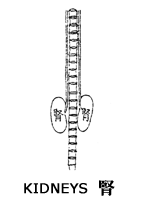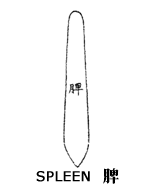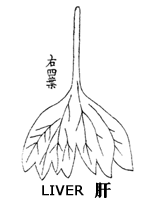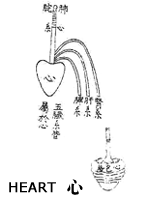|
|
According to TCM theory, chest pain syndrome has the following causes:
1. Weakened health due to aging
According to TCM theory, elderly people gradually suffer a decline in kidney qi, resulting in different health problems. Declining kidney functions may be manifested as kidney yin deficiency and/or kidney yang deficiency. A deficiency in kidney yang can lead to yang deficiencies of the five yin organs (liver, heart, spleen, lungs , and kidneys), which means that the functional aspects of these organs will have insufficient support. As a result, heart yang becomes deficient and fails to perform normal functions. On the other hand, if kidney yin becomes deficient, there will be insufficient yin nourishment of the five yin organs leading to heart yin deficiency. (In western terms, heart yang may actually be understood as the pumping action of the heart and is related to the sympathetic nervous system's excitatory influence on the circulatory system. Heart yin, on the other hand, may be understood as metabolic nourishment of the heart. It is related to the parasympathetic nervous system's inhibitory influences.) Deficiency of both heart yin and yang will ultimately lead to poor circulation of qi and blood in the body, since the heart is responsible for "ruling" the blood. Consequently, qi will become too stagnant to "push" the blood around the body, and blood stasis (a condition where the blood is unable to flow smoothly) will occur. Blockage of the blood vessels in the heart and meridians can then lead to chest pain. In western terms, this is known as angina. is unable to flow smoothly) will occur. Blockage of the blood vessels in the heart and meridians can then lead to chest pain. In western terms, this is known as angina.
2. Improper diet
If our diet contains too much fatty and greasy food, digestion will be harmed. In TCM, it is said to affect the spleen harmony. As a result, the spleen cannot transform food and liquids into a nutritive essence used for qi and blood formation and then transport this essence throughout the body. The untransformed fluids and food start to accumulate and gradually form into an unhealthy dampness called "phlegm." Phlegm dampness is one of the pernicious evils that has viscous (sticky) and stagnant properties. Therefore, it blocks the vessels and inhibits the flow of qi and blood, which in turn leads to chest pain.  The relationship between a person's diet and chest pain in TCM is very important. This thinking is similar to the western medical view that eating too much cholesterol and fat is a factor in the development of atherosclerosis. The relationship between a person's diet and chest pain in TCM is very important. This thinking is similar to the western medical view that eating too much cholesterol and fat is a factor in the development of atherosclerosis.
3. Emotional disorder
As already discussed, unhealthy phlegm dampness will lead to stagnation of qi and blood, which is considered a main cause of chest pain. Sometimes, emotional disorders lead to the formation of phlegm dampness. For example, "thinking too much", (earth element of the five emotions), will harm the spleen (earth element of the five organs). Without healthy transformation of the spleen dampness will accumulate. Anger (wood element of the five emotions) also affects the liver (wood element of the five organs). As a result, the liver can lose its spreading properties and fail to maintain the smooth flow of qi. The constrained liver qi will finally form into liver fire. It burns the body fluids and turns them into viscous (sticky) and unhealthy phlegm, which leads to chest pain. properties and fail to maintain the smooth flow of qi. The constrained liver qi will finally form into liver fire. It burns the body fluids and turns them into viscous (sticky) and unhealthy phlegm, which leads to chest pain.
4. Attack of coldness evils
In TCM, "coldness" is associated with increased viscosity (stickiness) and stagnant properties. An example of this is oil which becomes viscous and does not pour easily when it is cold. As coldness belongs to yin, its influence will inhibit heart  yang. Without sufficient heart yang, the heart cannot "rule" the blood properly. Therefore, heart vessels and meridians become blocked, and chest pain results. yang. Without sufficient heart yang, the heart cannot "rule" the blood properly. Therefore, heart vessels and meridians become blocked, and chest pain results.
|
| |
|